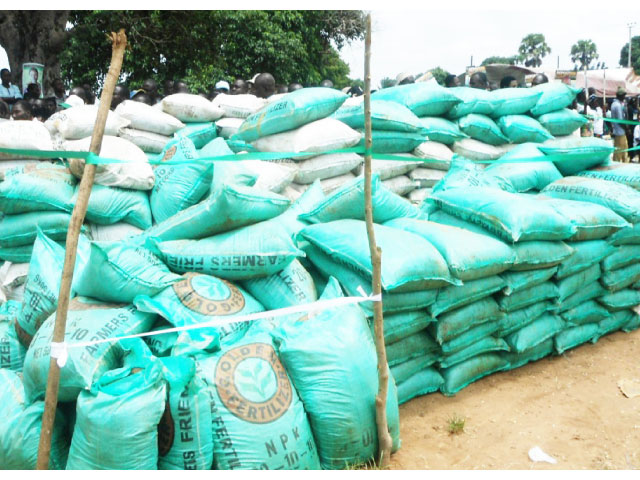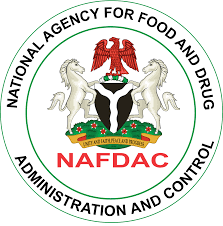Agriculture
FG Bans Foreigners from Buying Farm Produce Directly from Farmers

By Aondowase Kajo, Abuja
The Federal Executive Council (FEC) in a meeting presided over by Vice President Yemi Osinbajo, on Wednesday, approved the immediate ban of foreigners from buying farm produce directly from Nigerian farmers.
Foreigners will now have to go through licensed local buying agents to do business with the farmers.
The move by the government is a deliberate step to prevent farmers from being cheated by foreigners who buy the farm produce from them.
Minister of Trade and Investment, Niyi Adebayo, who briefed the media on the approval by council, said he presented two memos before FEC, one of which was the promotion of agribusiness in Nigeria through right farm gate pricing and ban on foreigners and their representatives from purchasing agricultural commodities at the farm gates.
He said that FEC approved the establishment of an appropriate mechanism that would not only protect the indigenous farmers in terms of achieving the right prices for their goods and commodities, but also ensure that they have the appropriate incentives and the needed encouragement to guarantee their continued participation in the farming business.
According to him, over the years, foreigners have been going to the farm gates to buy produce from the farmers at low prices, thus discouraging the farmers from continuing with their trade.
He said: “we finally got approval from FEC today for only licensed local buying agents who must be registered by the relevant national commodity associations, they are the ones who now will be able to buy goods directly from the farmers and sell to the foreigners.
“This way, the farmers will no longer be cheated by these foreigners who just throw money at them and are able to buy their goods”.
The Minister also disclosed that he presented another memo to FEC for the approval of Trade Policy Action Plan with the theme “Unleasing Nigeria’s Development Potentials through Trade and Investment”.
He said the Action Plan which was also approved by Council was formulated with a view to utilising trade as another means of generating revenue outside oil whose revenue is on the downward trend.
Adebayo said: “The whole idea is that because we’re not making as much money as we used to from sale of oil, and because of reduction in the money that comes from that aspect of Nigeria’s revenue generation, we want to utilize trade as a means of generating revenue for the country.
“So, the action plan aims to utilise the existing national trade policy to facilitate an effective use of international trade and investment as tools for economic growth and poverty reduction in the country.
“So, we’ve got approval from Council today to engage with all the ministries, departments and agencies involved in trade and revenue generation, and also the organized private sector and civil society organisations to ensure a successful implementation of the trade policy action plan.
“One of the next steps that we will be taking now that we have this approval, is to inaugurate a committee which will look into the update of the existing trade policy, which was last updated in 2002. And also, we’ll be looking into coming up with an investment policy. And these two policies we believe should be ready before the end of this year”.
On his part, Minister of Communications and Digital Economy, Dr Isa Pantami, said FEC okayed the introduction of another layer of quality assurance certificate in government digital services.
He explained that before now, all federal public institutions have been mandated by law and also by government policies, that before they embark on any information technology project, they must obtain IT Project Clearance to embark on it.
“There are so many benefits of that, this is provided for in NITDA Act 2007, Section 6, under Article A and the Federal Government has re-emphasized that through a circular on 31st August 2018. So many federal public institutions have been complying with this and the report is very commendable.
“We presented the report before the Federal Executive Council today. The report covers 1st of January, 2021 to 31st December ,2021. This is a copy of the report; IT Project Clearance Performance Report for Government Digital Services 2021.
“This report captures all the IT projects in the country, particularly towards our government digital services for the whole year. In that report, it is clearly mentioned that 282 major projects were submitted for clearance, out of this number 258 were cleared and 24 were rejected and the total amount submitted seeking for permission to implement the project was over N213 billion by many federal public institutions.
“Out of this, NITDA cleared around N154 billion and if you compute the amount submitted and the amount approved, you will discover that we are able to save more than N24 billion for the federal government of Nigeria. More than N24 billion, comparing the proposed amount and the approved amount for the implementation,” Pantami said.
Agriculture
Experts urge Media to Present Information on Genetically Modified Foods Objectively

The National Biotechnology Research and Development Agency (NBRDA) has urged the media to stand in the communication gap in favour of biotechnology development n Nigeria, re-affirming the safety in the consumption of genetically modified foods.
Prof. Abdullahi Mustapha, Director General/Chief Executive Officer of the agency, affirmed this during a one-day media field trip to NBRDA FARMS on Monday in Abuja.
The trip was organised by Open Forum On Agricultural Biotechnology (OFAB), an initiative of the African Agricultural Technology Foundation (AATF).
“Today, you shall be visiting our TELA Maize farms. This provides an exciting opportunity to see for yourselves what we have been doing here and equally gather your findings on what you have seen today and then take back the message to the people to quell some of the miscommunications about Genetically Modified Organisms (GMO) crops.
“TELA Maize hybrid varieties were developed to address some of the pressing challenges facing our farmers, including pests and diseases that can significantly reduce crop yields,” he said.
According to him, the production of the TELA MAIZE hybrid was done through the combined efforts of scientists at the Institute for Agricultural Research (IAR), Zaria in collaboration with stakeholders in key institutions such as NBRDA, NBMA, NASC, and the AATF Research Team.
“We are here to showcase our demonstration farms of genetically modified versions of commonly consumed crops developed by our scientists that have enjoyed rave reviews from the global world of science and the agricultural sector.
“These experts have worked tirelessly to ensure that this crop is not only high-yielding but also safe for human consumption,” he added.
He noted that the National Biosafety Management Agency (NBMA) has been instrumental in ensuring the safety and efficacy of TELA Maize which is believed to have the potential to transform the agricultural landscape in Nigeria and beyond.
Dr Jean Baptiste, the Regional Representative of the African Agricultural Technology Foundation, said that GMOs were aimed at leveraging the potential of biotechnology to develop a system that will help farmers.
He said Tella maize is a variety, developed using biotechnology methods to control insects.
“It also checks the resistance to drought and controls army worms, and stem borers in maize.
“At the end of the day, the benefits are enormous because it helps farmers increase yield and to be able to meet food security issues.
Dr. Francis Nwankwo, a TELA MAIZE developer from the African Agriculture Technology Foundation (AATF) explained the processes saying Tela maize passed through a genetic transformation that happens at the DNA level .
“They are not manufactured. What happens is we identify genes that can inhibit the infestation or reduce the infestation of some lepidoptera pests that affect some crops.
“So when we identify those genes we incorporate them into the DNA of maize thereby making it the maize, plus the genes.
“That way we increase the genes and reduce the struggles that our conventional maize go through on our farms like the stem borrower and others,” he said.
In her presentation, Dr Rose Gidado, Director, Agricultural Biotechnology Department, NBRDA, explained that many countries have derived huge benefits from TELA maize citing countries such as the U.S. and Canada.
“We actually brought you here so you could see the disparities between the TELA MAIZE and the non-TELA MAIZE species, and the environment which is far different from what we see on social media.
“We have other crops like beans that have actually been through the same gene transfers and are doing perfectly well and are safe for consumption,” she said.
She, therefore, urged the media to be on the guard in view of a lot of misinformation going round on social media and take responsibility in providing related information to the public adequately and objectively. (NAN)
Agriculture
Epe LG Empowers 200 Farmers to Boost Food Production

Ms Surah Animashaun, the Chairperson, Epe Local Government, has empowered 200 farmers with cash and other agricultural inputs to boost food production in the area.
Animashaun distributed the agricultural inputs to the beneficiaries at the council secretariat in Epe on Thursday in Lagos.
She said the initiative was aimed at supporting farmers in order to boost food production in the various communities of the council.
Animashaun said the farmers who benefitted from the gesture are expected to be considerate in their price fixing after harvest to ensure the affordability of food for all Nigerians.
“With the economic situation now and the support being giving to you, farmers should be reasonable in fixing prices after harvest to ensure that ordinary Nigerians source food at a more convenient price nationwide.
“We are here to give you support for your farming activities today, we expect that you reciprocate tomorrow by selling at a more affordable price to the people tomorrow,’’ she said.
Animashaun explained that each of the benefiting farmers received N50,000 and essential grains such as maize and sorghum.
She said the council would continue to support the farmers for them to be strong in farming activities.
Animashaun also used the medium to highlight her administration’s ongoing efforts in the extension of palliatives to other sectors of the economy.
She urged the communities in the area to maintain harmony, love, hospitality, and compassion, particularly in the face of the present economic challenges.
Also speaking, Mr Sikiru Owolomoshe, the Vice Chairman of the council, urged the farmers to take advantage of the gesture to improve their activities in order to encourage others.
Mr Olayinka Kazeem, the Secretary of Epe Farmers and a beneficiary, expressed gratitude to the council chairperson and her management.
“This is the first time we are witnessing this kind of programme and it is coming at a critical period when many states are facing food shortage,’’ he said.
He assured that the beneficiaries would do their best to ensure the objective was achieved.
Mr Ahmed Surakat, the Public Relations Officer of Lagos State Fishermen Cooperative Association, and Mrs Kafilat Animashahun beneficiaries, extended their gratitude to the council chairman for her unwavering support to farmers.
Earlier, the President of the Epe Farmers Union, Mrs Aminat Shabi, lauded Animashaun for the comprehensive support to other agricultural value chain such as fish farmers and livestock producers.(NAN)
Agriculture
Food Security Achievable Through RAAMP, Says National Coordinator

By Tony Obiechina, Abuja
The Rural Access and Agricultural Marketing Project (RAAMP) has been described as an appropriate and very effective means of realising food sufficiency and security across the country.
The National Coordinator of RAAMP, Engr Aminu Bodinga Mohammed who made the assertion during the 7th Joint World Bank and French Development Agency Implementation Support Mission of RAAMP at the Shehu Musa Yar’Adua Centre, Abuja, pointing out that most urban centers derive their supply of food from farms, which are located at the rural communities.
His words: “the primary objective of RAAMP is to improve rural roads and trading infrastructure through to boost food production.
Therefore the successful implementation of this project could go a long way towards guaranteeing food sufficiency and security across the country”.He solicited for concerted efforts by all stakeholders to ensure an all-round success of the project.
Aminu noted that the mission was to evaluate the current implementation status, milestones as well as challenges faced by the 19 states participating in the project and announced that arrangements had reached an advanced stage for the commencement of civil works on agro-logistics centers (ALCs) latest by September, 2024 with 23 major contracts that would be awarded across the states.
ALCs refer to market hubs that have been prioritised for transformation to ultra-modern standards at various locations across the country , notably in rural communities to empower and enhance the livelihoods of the people.
Also speaking, the Task Team Leader of the World Bank, Mr. Rakeesh Tripathi hinted that a scale-up was being mooted for the project but emphasized that only states which must have established and operationalised the Rural Access Road Agency (RARA) and State Road Fund (SRF), backed up with the required standing on counterpart funds would be eligible to access the scale-up funds.
He therefore advised all states to take advantage of the mission and get the needed support to tackle every challenge facing their State Project Implementation Unit (SPIU), adding that all the 36 states and the Federal Capital Territory would be encouraged to embrace the scale-up project.
Highpoints of the exercise were presentations by the State Project Coordinators of the respective participating states, question and answer sessions, comments and observations, among other inputs by the stakeholders.
The Task Team Leader of the French Development Agency, AFD; Consultants from the World Bank; the Federal Project Management Unit, FPMU as well as State Project Implementation Units, SPIUs of RAAMP also attended the mission.




















